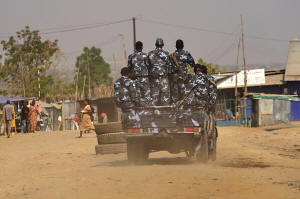The US has revoked visas for South Sudanese while civil war threatens at
home
[April 07, 2025]
The United States once cheered the creation of South Sudan as an
independent nation. Now the Trump administration has abruptly revoked
the visas of all South Sudanese, saying the countryís government has
failed to accept the return of its citizens ďin a timely manner.Ē
The decision means South Sudanese could be returned to a nation again on
the brink of civil war or unable to seek the U.S. as a haven.
There was no immediate response from South Sudanís government, which has
struggled since independence from Sudan in 2011 to deliver some of the
basic services of a state. Years of conflict have left the country of
over 11 million people heavily reliant on aid that has been hit hard by
another Trump administration decision ó sweeping cuts in foreign
assistance.
Hereís a look at South Sudan, whose people had been granted temporary
protected status by the U.S. because of insecurity at home. That status
expires on May 3.
A deadly divide
The euphoria of independence turned to civil war two years later, when
rival factions backing President Salva Kiir and deputy Riek Machar
opened fire on each other in South Sudanís capital, Juba, in 2013.
The two menís tensions have been so much at the heart of the countryís
insecurity that Pope Francis once took the extraordinary step of
kneeling to kiss their feet in one of his pleas for lasting peace.
Five years of civil war killed hundreds of thousands of people. A peace
deal reached in 2018 has been fragile and not fully implemented, to the
frustration of the U.S. and other international backers. Notably, South
Sudan still hasnít held a long-delayed presidential election, and Kiir
remains in power.

His rivalry with Machar, compounded by ethnic divisions, has simmered
through multiple attempts to return Machar as a vice president. Machar
has long regarded himself as destined for the presidency, citing a
prophecy years ago by a seer from his ethnic group.
Late last month, the threat of war returned. Machar was arrested and his
allies in the government and the military were detained following a
major escalation: A militia from Macharís ethnic group had seized an
army garrison upcountry. The government responded with airstrikes.
Dozens of people were killed. A United Nations helicopter was attacked.
Following the arrest, Macharís opposition political party announced
South Sudanís peace deal is effectively over.
ďLetís not mince words: What we are seeing is darkly reminiscent of the
2013 and 2016 civil wars, which killed 400,000 people,Ē U.N.
Secretary-General Antonio Guterres warned days ago.
[to top of second column]
|

South Sudan soldiers patrol the street in Juba, South Sudan on
Thursday, Feb. 13, 2025. (AP Photo/Brian Inganga)

Some Western countries have closed their embassies there while
others, including the U.S., have reduced embassy staff.
A country in disarray
South Sudanís government has long relied on the country's oil
production. But little of that money has reached the people, in part
because of official corruption. Civil servants at times go months
without being paid.
Conflict in neighboring Sudan has affected landlocked South Sudanís
exports of oil. Refugees spilling over from Sudan have added to
instability at home.
Climate shocks including flooding have caused mass displacement and
closed schools. South Sudanís health and education systems were
already among the weakest in the world. Aid organizations have run
or supported many. Now that support network has been hit by sweeping
cuts in U.S. aid.
The Trump administrationís announcement Saturday evening revoking
visas for all South Sudanese with immediate effect is in sharp
contrast to Washington's past warm embrace as its rebel leaders ó
including Kiir and Machar ó fought for independence.
Educational and other opportunities for South Sudanese have been
available in the U.S. for years. On Saturday, hours after the State
Department announcement, a freshman from South Sudan was in Dukeís
starting lineup at the men's NCAA basketball tournament Final Four.
Duke spokesman Frank Tramble told The Associated Press the
university was aware of the announcement and was "working
expeditiously to understand any implications for Duke students.Ē
It was not immediately clear how many South Sudanese hold U.S. visas
or how American authorities will follow up. Deputy Secretary of
State Christopher Landau said on social media the dispute centers on
one person, certified by South Sudanís embassy in Washington, that
Juba has refused to accept. That person was not named.
No new visas will be issued, the U.S. said, and ďwe will be prepared
to review these actions when South Sudan is in full cooperation.Ē
___
Associated Press sports writer Jim Vertuno in San Antonio, Texas,
contributed.
All contents © copyright 2025 Associated Press. All rights reserved |